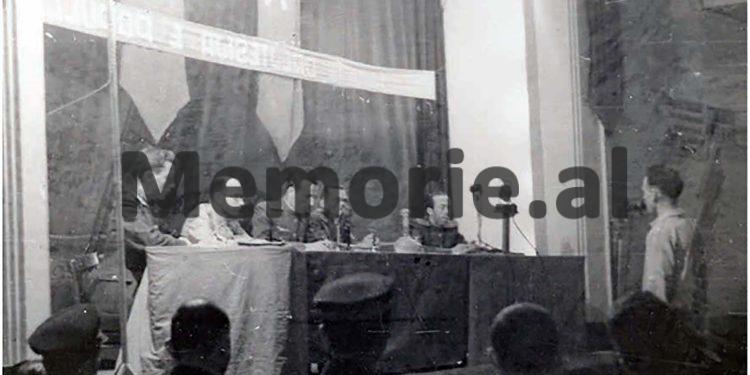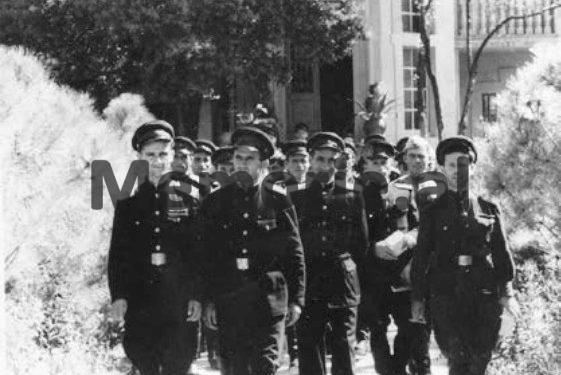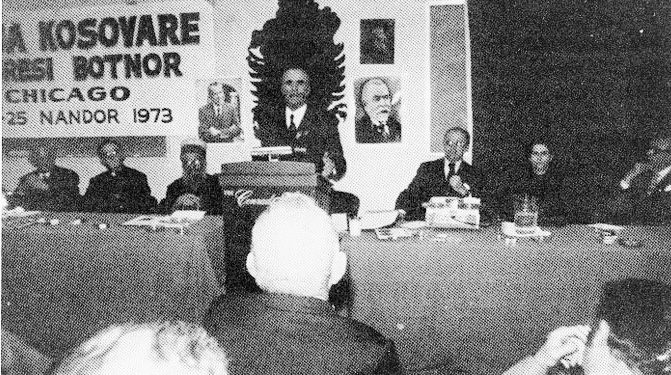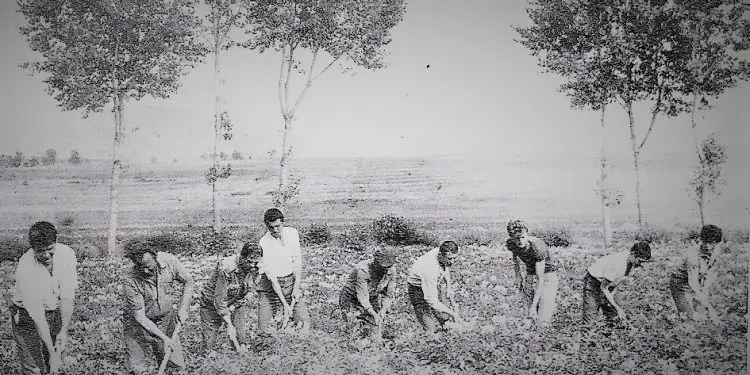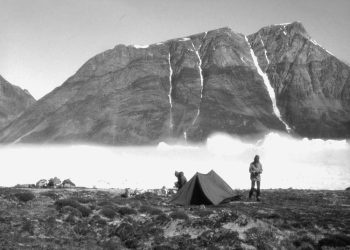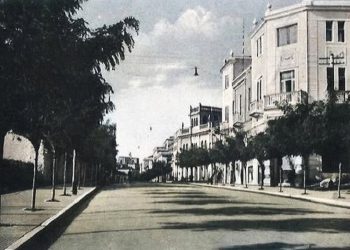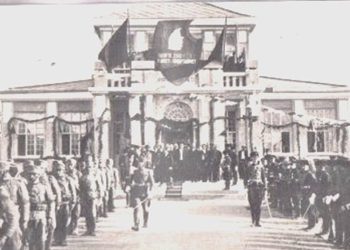Memorie.al / The CIA have uncovered the details of the State Security congress held in 1952. Through a declassified article, the speeches of Mehmet Shehu and Kadri Hazbiu are shown. An important point in the discussions was also about the morale of the State Security members. On the other hand, it is stated that while State Security was being discussed, Mehmet Shehu was notified of the death of Minister Niazi Islami.
April 21, 1951
The Greek daily “Messager d’Athenes”
Albanian Refugees Describe the Difficult Situation
According to refugees who have recently arrived in Greece, 90 percent of the population is strongly anti-communist, and hatred for the regime increases day by day. However, opportunities for clandestine action are very limited. The communist government keeps the population under control with brutal oppressive measures, but acts of resistance have still been noted. In February, eight anti-communists dressed in police uniforms entered the village of Hoçisht near Korça and killed the communist Festim Kajo.
Meanwhile, in Zemblak, unidentified persons set fire to the barns and tool sheds of the local cooperative. 22 people were arrested on March 19, 1951, two of whom were sentenced to hanging and two to life imprisonment. The prosecutor of the “trial” was Loni Dimoshi. Abdul Kalaja, one of those sentenced to hanging, admitted that the sabotage had been carried out on the orders of armed resistance groups in the area, with whom he had been in contact in Zemblak, Eçmenik, and Cangonj. Three officers and 12 soldiers from the Pogradec unit recently escaped to Yugoslavia.
At the end of January 1951, there was a demonstration in front of a bakery in Korça, where a civilian was beaten to death by the police, which is why people later called the place; “The bakery of death.” In early March 1951 in Tirana, anti-communist groups reportedly attacked the Soviet embassy with automatic weapons and a bomb. Several high-ranking Soviet officials and an Albanian official were injured there. It is said that among the people accused of the incident were Minister Tuk Jakova, General Beqir Balluku, Myslim Peza, and Timo Dimoshi, a member of the Korça Party Committee.
The communist authorities have increased arrests against the so-called anti-communist groups. Refugees coming to Greece speak of concentration and forced labor camps in Tepelena, at the Kamza Farm (called “Red Star”) as well as in Valias near Tirana. The Albanian government is carrying out a widespread propaganda campaign to convince the population that Greece will attack Albania at any moment, but these rumors are now met with indifference by the people.
Cooperatives
Peasants are forced to join cooperatives for fear of forced labor. The Bank of Albania says it offers loans to peasants of up to 10,000 lek, but none of them are interested, as just one fine costs 12,000 lek. The rural population receives much less food than the city population. Peasant families receive a certain amount of kerosene every month, but products such as oil, rice, soap, etc., are not given to the peasants. The peasants must hand over to the state 44 kg of wheat per hectare, 49 kg of corn and 35 kg of beets, and in addition to this, they must pay taxes according to the amount of land they use.
The workers’ salary is from 80 to 150 lek per day, while mine workers receive 250 lek per day. The prices of goods are very expensive; 1 kg of corn costs 80-100 lek, while one kg of wheat, 120-140 lek. A cotton suit costs about 10,000 lek, while a pair of shoes costs 1500-2000 lek. The majority of the population believes that war is inevitable and would welcome a conflict to get rid of the communist regime.
May 1951
The Congress of State Security Officers
From February 25, 1950, to March 1, a meeting of State Security officers was held in Tirana, in a building about 200 meters away from the former Royal Palace of King Zog. The meeting was the first since the execution of the former Minister of Internal Affairs, Koçi Xoxe, and the arrival of Mehmet Shehu in the post. The first to speak was Mihallaq Zilishti, the Deputy Minister of Internal Affairs, who had just returned from an inspection tour in the cities and villages of Albania. He enumerated the progress and obstacles of some organs and explained why he thought they were not functioning.
On February 26, Minister of Internal Affairs Mehmet Shehu, spoke at length on the following topics:
- “The mismanagement and injustices done to the people by the regime, before Shehu’s coming to power.”
- “The shortcomings of the State Security in following the party’s political line, and the deviations towards the Trotskyist line.”
- “The deterioration of the morale of the State Security agents and the current efforts to improve it.”
- “The possible arming of the peasants who support the regime.”
After Mehmet Shehu, Kadri Hazbiu took the floor, who presented the functions of the different sections of the organization, making comparisons of the results. On February 27, 1950, while Mehmet Shehu was in the meeting, an officer came and gave him a note. After reading the note, Shehu got up and returned only after an hour. When Shehu returned, he declared that Niazi Islami, the Minister of Transport, had committed suicide. Islami was later buried by his family, without state honors.
On March 1, 1950, a group of 400 officers (250 State Security agents, and about 150 police chiefs) went to the Police School to listen to the closing speech of the Security Congress, by the leader Enver Hoxha. Hoxha praised the work of the State Security and warned the officers who had not understood the spirit of the regime. He also praised the “great” Stalin and promised a brilliant future for Albania.
June 15, 1952
Published by “Free Albania”, Rome
Massive Resistance among Communist Officials
For some time now, the work of low-level officials of the communist administration has not satisfied the high circles of the party. The high chiefs are concerned that the number of officials who agree to spy for party members is decreasing day by day. This may be the result of a loss of confidence in the stability of the current regime, and consequently, they fear being compromised in the eyes of the people, or a successor government. They demand that the mistakes of the past be forgotten. Party organizations, especially in centers far from Tirana, have not performed their duties; they have not appeared regularly at meetings, and when they do, they do not openly discuss problems.
Officials of local organizations do not use criticism and self-criticism, as they neither want to be ridiculed by their comrades nor do they want to break up with them. But they only fear those who give orders from Tirana, according to the directives of the Soviet bosses. Party instructors have not upheld professional or Marxist-Leninist standards and party leaders complain about a lack of reports on the activities of communists and non-communists. Most officials do not want to take responsibility for their work and are overly tolerant of other party members. The party hierarchy accuses instructors of sentimentalism and a lack of revolutionary spirit in their relations with subordinates and superiors.
Most of the officials who were active in the National Liberation War were young and inexperienced, while now they are only tempted by the promise of a career. These behaviors, which can be defined as sabotage, also come from the fear of being compromised in the eyes of the masses, and have made them exponents of passive resistance. These factors, together with the contempt that the people have for party officials, have helped to create a silent agreement of coexistence between the people and low-level officials of communist organizations, in many villages and localities, mainly in the mountains. The communist government continues to trumpet the great achievements for the welfare of the people, especially the workers.
They claim that the conditions created by the dictatorship of the proletariat are the most suitable for communist development. Last week in a speech to the party, Mehmet Shehu emphasized; “the leading role of the working class,” but the truth is that the miserable conditions of the workers are the most serious accusation of fraud and shamelessness for the Communist Party. It is enough to visit the houses of the workers of the Vlora Rice Factory, where ten workers live in one room, in a house near the factory. The most minimal conditions are missing, while the sanitary situation is miserable. In the evening, the rooms are lit with lanterns, while the dining room has no windows.
Every evening after work, the workers have to wait 45 minutes to get their food ration, and then return to the dining room, where they often find the door locked. Until now, the state bureaucracy, especially the agitation-propaganda group, has made all kinds of promises to calm the people, telling them that this phase will end soon and that they should have patience, because with their sacrifices, socialism is being built. But the workers are tired of empty promises and have expressed their dissatisfaction with protests that they would not have dared to make before. Those who do not accept the orders for sacrifices do not understand why the high-ranking leaders live in luxury at the expense of the workers.
The Resumption of Economic Progress
July 1952
Source: Vneshniaia Torgovlia, K. Viriasov, V. Martinov
In January 1952, the Albanian people marked the sixth anniversary of the proclamation of the People’s Republic of Albania with great political and labor force improvements. The years after the proclamation of the Republic were a successful effort by the Albanian people to strengthen the democratic system and build the foundations of socialism. The People’s Republic of Albania, with the strong support of the Democratic and Socialist Camp led by the Soviet Union, is successfully following the path of building a democratic state of the people and the independent development of the economy and culture. The most important factor in the improvement of the economy is the implementation of the 2-year economic plan 1949-1950.
Despite the great destruction caused by the war, the volume of production after the 2-year plan considerably exceeded pre-war production. In 1950, production increased by more than 3.7 times in the mining industry and more than three times in factories. Production in the third quarter of 1951 was realized at 105 percent. The volume of work increased by 47 percent, compared to the third quarter of 1950. In 1951, important enterprises for the national economy, such as those for cotton, the “Lenin” Hydropower Plant, the Sugar Factory with a capacity of 10,000 tons per year, and the Textile Combine, were put into operation. The Sugar Factory and the textile industry fulfilled the needs of the whole country with sugar and clothing. Equipment for the enterprises was supplied by the Soviet Union, which also helped Albania to put them into operation. The new Republic has also made progress in agriculture.
Cultivated lands in 1950 exceeded pre-war levels, and the area planted with industrial production exceeded pre-war levels by 11 times. Wheat production exceeded the pre-war level by 40 percent, and the production of sugar beets and cotton also increased. Much attention has been paid to raising cattle. As a result of the completion of the two-year plan, the number of cattle heads exceeded that of the pre-war period. The government is helping agriculture in many ways, by giving the best seeds of wheat, fruit trees, and a considerable amount of fertilizers. More than 672 million lek was spent on the irrigation and drainage of lands, while about 157 million lek was given to peasant farms until the end of 1950. They also received credit for spring plantings in 1952.
An important factor in the development of agriculture is the development of work mechanisms and the creation of Machine and Tractor Stations. The number of tractors in 1951 exceeded that of 1947 by 3.6 times. More than 3000 plows, 900 cultivators, 300 cutters, and many other tools were sent to the crop-growing regions, significantly increasing production. Albania has also had success in strengthening its financial system, as for 1951, the state budget brought in revenues of 9,500,000,000 lek.
The main source of the budget is the socialist sector of the economy. Expenditures for the national economy reached 3,607,000,000 lek, compared to 2,252,000,000 lek in 1950. Close economic ties with the Soviet Union and other people’s democracies have been decisive for Albania’s successful development. According to an agreement in February 1951 with the Soviet Union, for industrial equipment, Albania has strengthened technical preparation and increased credit. Albania has also increased trade with Poland and Czechoslovakia, as well as with East Germany and other People’s Democracies, such as Bulgaria, Hungary, and Romania.
February 1953
Source: “Flamuri i Lirisë”
Economic Conditions, Standard of Living
Law No. 226 places workers in seven payment categories, ranging from 202 to 800 lek per day. Office workers receive 2,400 to 7,000 lek per month, depending on the location and enterprise. A married worker receives 3,500 lek per month and must pay taxes, social contributions, and membership in sports clubs, food rations, office renovations, and occasional telegrams for Stalin, protest telegrams against border provocations, newspaper subscriptions, and aid for Korea. Monthly rations and expenses for necessary goods are as follows: 2 kg of bread per day, 300 lek; 1.35 kg of sugar, 75 lek; 1 kg of oil, 65 lek; 2 kg of beans per month (only for the first 3 months of the year), 140 lek; wood, 550 lek per cubic meter; rent 100 lek; lights 100 lek.
If the worker smoked a pack of cigarettes a day, he would spend another 500 lek a month, and this left very little to buy meat, which costs 130 lek/kg, vegetables at about 40 lek/kg, clothes, or other items. If the worker is unemployed, he receives 25 percent of the salary from social support if he is not a member of the Union and 60 percent if he is a member. He is forced to take part in unpaid voluntary work in addition to his regular work. Peasants are forced to hand over a large part of their production to the state, even if they cannot afford it. Thus, a family is forced to eat only cabbage during the last three months of a year, with poor production. Until the end of 1951, a farmer could abandon his land if he did not fulfill these obligations and go to work in a mine to earn 400 grams of bread per day, thus saving himself from prison.
While now he is forced to work his land before he is allowed to abandon it. After handing over the production to the state, the farmer receives the following amounts for each kilogram of production: wheat 2.5 lek, other grains 2 lek, corn 2.5 lek, wool 33 lek, for each egg, he receives 1 lek, cotton 18 lek, tobacco 23 lek, sunflower 27 lek. The reward can also be received in the form of horseshoes, nails, baby cradles, or other handcrafted items. To get industrial products, such as shoes or peasant clothes, he had to bring in addition to his quotas also; cheese, olives, butter, or oranges. Usually, farmers cut down almond trees to avoid the payment of 3000 lek per tree. The conditions of farms and cooperatives are getting worse and worse. There is great hunger, as each person gets only 8 kg of corn per month, and sometimes even that is missing. Meat is distributed only during holidays.
Distributions, Mining Conditions
Hamit Koçi, a former resident of Okshtun in Peshkopi, now a refugee in Yugoslavia, reported on the economic conditions of Albania that the state buys meat from the peasant for 9 lek per kg. Wheat is bought for 2.5 lek and sold for 150 lek. Wool is bought for 30 lek and sold for about 500 lek. Since the peasants are forced to hand over their specific products to the state, and since in many cases they do not have them, they are forced to buy them in stores to fulfill their obligations. Isuf Koçi, Hamit’s brother, who also escaped to Yugoslavia, described the performance of voluntary work in the Bulqiza mine as follows: One day the head of the municipality of Okshtun i Vogël, read the list of names brought by the State Security. The list had the names of all those who “had requested” to work voluntarily in the Bulqiza mine, for the completion of the production plan. It had the name of Isuf Koçi, who on that day had worked in the field and the calling of his name came as a surprise.
But he was forced to leave the farm and continue with the others to the mine. Initially, they were told that they would work for a month, but as it turned out later, they stayed there for a long time. Isuf Koçi described life in the mine as unbearable. He said that the food was very bad and they were not given anything for breakfast. At lunch, they received potato and bean stew, while for dinner; they were given two boiled eggs that often had chicks. There were also many volunteers, who, because they were considered richer, were forced to bring their own food with them. For the work, they were paid 70 lek per day, with which they then had to pay for “food and lodging.”
At the end of the month, they had nothing left. Isuf Koçi continues: “It was announced that the work was 8 hours a day, but this was only on paper, as in reality they worked 16 hours or more: 2 extra hours for the Commander, (Enver) 2 hours for Stalin, for the realization of the plan and so on. If someone left the mines, the punishment was severe. He could be sentenced to 6 to 8 months of work in the mine, without pay or, with half pay. Such trials were held with a great ceremony to set an example and instill fear in the workers and peasants.” Memorie.al




